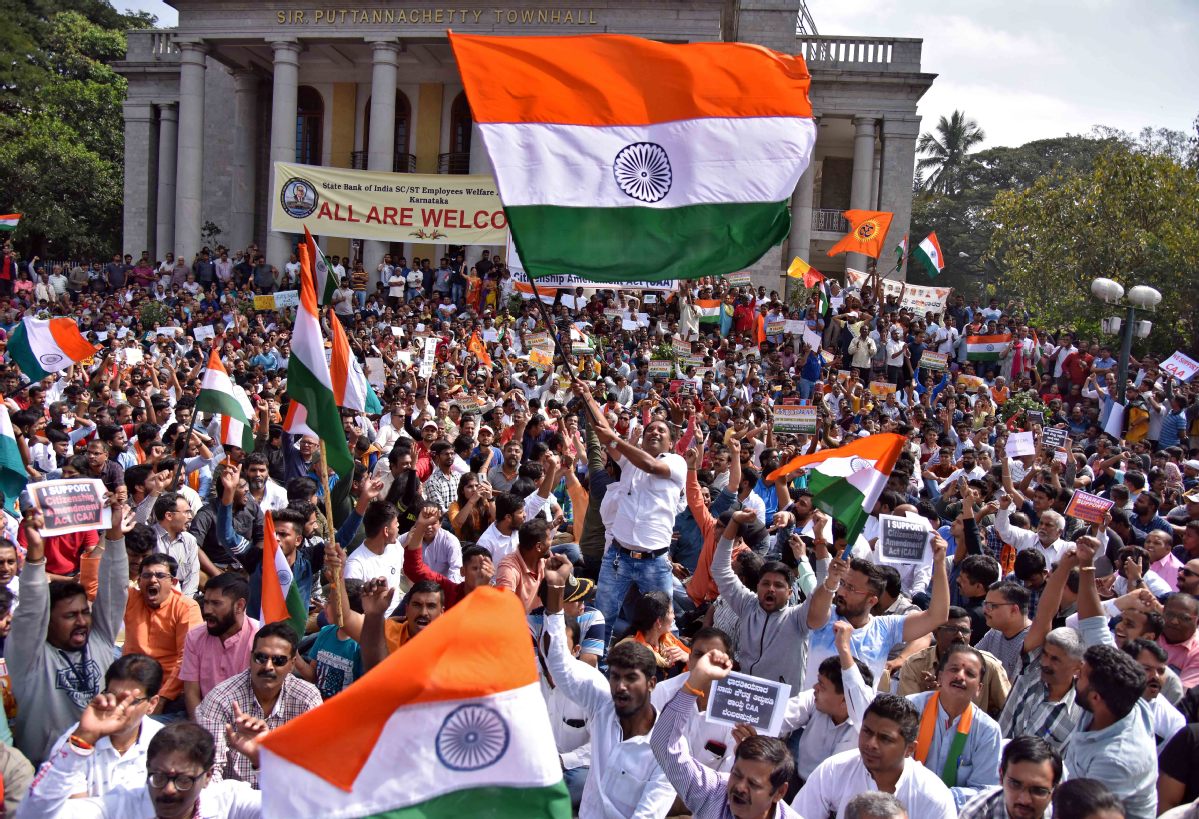
Demonstrators wave the Indian flag at a rally in support of a new citizenship law in Bengaluru, India, on Sunday. (Photo: China Daily)
Unrest over new law will exacerbate growth pressures in India, experts say
Widespread protests against a controversial new citizenship law in India will not only divide the country but further damage an already weakened economy if they drag on, experts warn.
The demonstrations and violent clashes have caused deaths since the Hindu nationalist Bharatiya Janata Party government led by Prime Minister Narendra Modi cleared the law in both houses of Parliament on Dec 11. While the government is standing firm in the face of opposition, many of India's Muslims and others argue that the law violates the essence of equality enshrined in the Constitution. Some rallies have been staged in defense of the law.
The legislation, which grants fast-track citizenship to non-Muslim refugees who entered India due to religious persecution in Pakistan, Bangladesh and Afghanistan, is highly contentious because religious identity is being linked to citizenship.
Even with the pro-government rallies, with some held last weekend, far more people are protesting against the citizenship act. The police are accused of causing the deaths of protesters, but they point out that shots have been fired by demonstrators.
In Firozabad city, in the state of Uttar Pradesh, police constable Vijendra Kumar had a narrow escape on Saturday after a bullet fired during a protest pierced his bulletproof vest and got lodged in a wallet inside his jacket.
Inside the wallet, "there were four ATM cards and some pictures of Shiv Ji (a Hindu god) and Sai Baba (an Indian saint)," Kumar was quoted as saying by news agency ANI. "It feels like this is my second life."
Others have not been so lucky. In Uttar Pradesh alone, 15 people have been confirmed as killed in the protests, the Hindustan Times newspaper quoted Praveen Kumar, the state's inspector general of police, as saying.
Scores have been injured, along with trains and buses torched and properties destroyed amid the protests by tens of thousands of people across India. The affected cities include Delhi, Mumbai, Kolkata, Bengaluru, Hyderabad, Patna and Chandigarh. Barricades have been put up in many of these cities, with a number of subway stations sealed off and shops shuttered.
In response, the government has shut down mobile and broadband internet connections, and banned rallies, including in Bengaluru. In the southern city, the authorities invoked a law that prohibits no more than four people from assembling if the police fear disturbances.
A business leader, who declined to be named for fear of reprisals, said that India cannot afford these upheavals at a time when it is struggling with an underperforming economy and high unemployment. He said the economy, which had registered double-digit growth until a few years ago, is struggling to expand even 5 percent this year.
Economist Abhirup Sarkar, who teaches at Kolkata's Indian Statistical Institute, said that the problems will mount if India is besieged by prolonged disturbances. "If that happens, investors will certainly rethink putting money in the country," he said.
However, he said that if there is calm and the market is attractive, investments will be made.
"It doesn't really matter if a country is dictatorial in nature, or democratic," Sarkar said.
On Dec 19, the Supreme Court said it will seek the government's responses to a clutch of petitions submitted against the constitutional validity of the act.
Modi told his supporters at a rally on Dec 17 that the opposition was "spreading lies and rumors", "instigating violence" and "used its full force to create an atmosphere of illusion and falsehood".
A senior government official, who is also a Muslim, said the law not only challenges the secular tenets of the Indian Constitution and undermines the country's religious and linguistic pluralism, "it is designed to carve a dangerous divide between communities who have been living together in peace for centuries".
"The fires of anger may be doused but I am not sure if the scars will ever be healed," the official said, on condition of anonymity. "There is an element of fear, anger and helplessness among the Muslims all over the country-a feeling of being alienated and left out."
He said the government is introducing a divisive law at a time when the country is reeling from a slowdown, the highest unemployment rate in 45 years and job cuts, as well as falling consumer demand.
Millions of people who have been living in India for generations do not have proper documentation for various reasons. The National Register of Citizens, or NRC, relies on extensive documentation to prove that an applicant's ancestors lived in India. This requirement makes many Muslim citizens fear that they could become stateless.
"Only the educated, the wealthy and the influential might have the resources to get things right if there arise any problems with regards to their NRC test. A slight clerical mistake in any document makes your existence questionable," the official said.
"We have seen how thousands of poor, illiterate and many others who got excluded from the NRC have been declared illegal residents."


